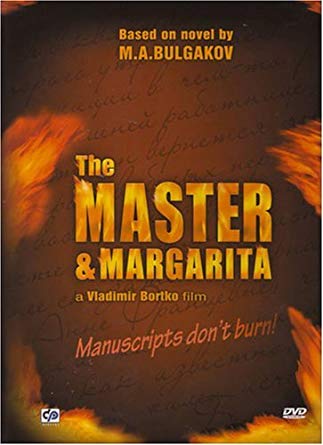 This Russian miniseries is the most accurate and monumental adaptation yet attempted of Mikhail Bulgakov’s MASTER AND MARGARITA. The novel is widely considered one of the supreme masterpieces of 20th Century literature, and I’m not about to dispute that assessment. Having read Bulgakov’s masterpiece twice, I find it a remarkable piece of work that fully retains all the shocking and insightful satire of its 1930s-era inception. This televised adaptation is notable for its unerringly faithful rendering of that book, although it misses much of what makes Bulgakov’s text the immortal classic it is.
This Russian miniseries is the most accurate and monumental adaptation yet attempted of Mikhail Bulgakov’s MASTER AND MARGARITA. The novel is widely considered one of the supreme masterpieces of 20th Century literature, and I’m not about to dispute that assessment. Having read Bulgakov’s masterpiece twice, I find it a remarkable piece of work that fully retains all the shocking and insightful satire of its 1930s-era inception. This televised adaptation is notable for its unerringly faithful rendering of that book, although it misses much of what makes Bulgakov’s text the immortal classic it is.
THE MASTER AND MARGARITA is the wildly fantastic, satirical account of what transpires when the Devil, a.k.a. the Professor, arrives in Moscow one day with a retinue that includes a talking cat named Behemoth and a vampire seductress. A series of outrageous comedic set pieces see various bureaucratic functionaries laid low by the Professor and his comrades. In this way Bulgakov takes a sledgehammer to the tradition of “Soviet realism” while offering a none-too-subtle critique of Stalinist Russia, with its staunch atheism and stifling bureaucracy.
Yet Bulgakov also includes an autobiographical element in his sad depiction of the Master, a persecuted writer who burns the manuscript of his latest novel in a frenzy of self-censorship (as Bulgakov did an early draft of THE MASTER AND MARGARITA), and his beloved wife Margarita. The latter is a thinly fictionalized portrayal of Bulgakov’s own spouse Elena Shilovskaya, who allegedly completed THE MASTER AND MARGARITA after her husband’s death in 1940. And there’s yet another layer to THE MASTER AND MARGARITA in its decidedly unorthodox depiction of the life of Pontius Pilate and his involvement in the death of Jesus Christ, an event flashed back to at several points in the text, it having a definite bearing on what occurs in the novel’s present.
Despite not having been published until the 1960s, the book is said to be all-but ubiquitous in modern Russia. This expensive 10-part miniseries adaptation of THE MASTER AND MARGARITA, broadcast on Russia’s state television channel in December of 2005, was heavily publicized in its native country and extremely widely viewed.
The program followed several previous attempts at adapting this remarkable work, including a bad Italian feature from 1975 and a 1994 Russian film that due to copyright issues was never properly released. Filmmakers as varied as Roman Polanski, Andrei Tarkovksy and Elem Klimov all made attempts at filming the novel, but none came to fruition.
Thus the miniseries under discussion, even though I’m not entirely enamored with it, must be counted as the premiere filmic rendering of THE MASTER AND MARGARITA. The director was Vladimir Bortko, who seemed determined to capture the novel’s every nuance over the course of 500 none-too-sprightly minutes. Bortko’s reverence for Bulgakov’s words is evident from start to finish, making for a fascinating work (especially for those of us convinced that a proper adaptation was unfeasible), but also an obsessive and exasperating one.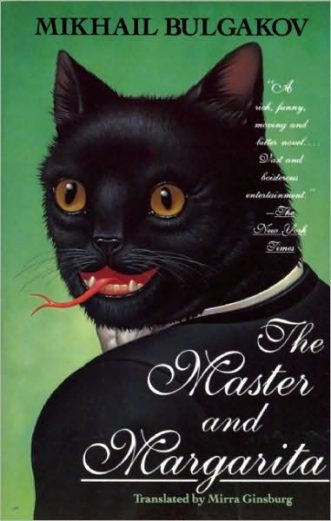
For all its undeniable charms, the series is glacially paced and downright ponderous. Dialogue sequences, taken verbatim from the novel, tend to drag on, some for as long as ten minutes or more. Bulgakov’s text may contain its share of “heavy” themes, but it’s also lively and fast-moving, two things this program definitely isn’t. It seems that in his all-consuming faithfulness to the text Bortko lost sight of what made it the classic it is, resulting in an adaptation that captures the letter of its source but definitely not the spirit.
Certainly this isn’t the first such reverential filming of a classic novel. Bulgakov’s HEART OF A DOG and Fyodor Dostoyevsky’s THE IDIOT both previously received the meticulous Vladimir Bortko treatment (the latter in a 2003 miniseries much like the one currently under discussion). There’s also Rainer Werner Fassbinder’s 15-hour TV version of Alfred Doblin’s BERLIN ALEXANDERPLATZ, which had a similarly minute take on its source material. The difference is that Fassbinder melded the minutiae of Doblin’s text with his own inscrutable genius, whereas if Bortko brought anything of his own to THE MASTER AND MARGARITA it doesn’t appear to have registered.
Yet the program is extremely well made. Cinematographer Valeri Myulgaut’s ever-shifting color scheme is intriguing, and the lavish production design convincingly recreates thirties-era Moscow (lensed in modern-day St. Petersberg) and passably does so with Christ-era Rome. The music score by Igor Kornelyuk does a fine job alternating dark, ominous tones with more playful, whimsical ones. The acting is quite fine across the board, with the standouts being Kirill Lavrov as Pontius Pilate and Aleksandr Galibin as the troubled Master, while the lovely Anna Kovalchuk makes quite an impression as Margarita (although that may be because she plays much of her role in the nude). The special effects also deserve credit, if only for the audacity with which they’re utilized.
There are reportedly a full 163 minutes (or nearly three hours) of CGI effects in this series, and while they don’t always work as well as they should (Margarita’s broomstick flight through Moscow is a bit of a bust), they do accurately visualize Bulgakov’s oft-outrageous flights of fancy. Stand-out images include a bird chauffer, dead souls materializing from a giant fireplace, and multiple walks up shafts of moonlight.
My final verdict? I like and recommend this MASTER AND MARGARITA, but maintain that a fast forward button is essential. And for you jokers out there scheming to watch it in lieu of reading the novel for a book report, keep in mind that it will probably take you less time to peruse the text than it will to view this program!
With that, here’s my ten-part summary of this monumental series—and I’ll warn you in advance that the following is an extremely long-winded summation!
Part the First: Sometime in the 1930’s, two men are chatting in Moscow’s town square about God. The gist: neither believes in Him.
A nattily dressed old guy joins them. He introduces himself as the Professor, and tells them of something he “witnessed”: the sentencing of Jesus Christ—or Yeshua—by Pontius Pilate, the governor of Judaea.
We too witness this event, which in the Professor’s recollection takes the form of a lengthy argument between Yeshua and Pilate. It concludes with Pilate becoming enraged that Yeshua takes his orders from a higher power, and not the rulers of Rome.
Back in the here-and-now the Professor grows similarly steamed that his listeners don’t believe his recollection—or that God exists. The Professor predicts one of the two men, a blowhard named Berlioz, will be beheaded by a streetcar, and, sure enough, this gruesome event comes to pass minutes later.
Part the Second: The surviving man, one Dr. Stravinsky, chases after the Professor, who’s joined by a tall guy in a checkered suit and Behemoth, a child-sized cat that can talk. But Stravinsky loses sight of them and disrupts a formal dinner party wearing only his underwear and a religious icon (don’t ask!). Unsurprisingly, he’s hauled off to a nuthouse.
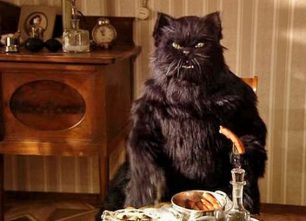 A second flashback to Pontius Pilate has him arguing with his superiors about who to execute. Pilate is against crucifying the guy he met the previous day, but he’s ordered to do just that.
A second flashback to Pontius Pilate has him arguing with his superiors about who to execute. Pilate is against crucifying the guy he met the previous day, but he’s ordered to do just that.
The Professor makes another appearance, this time in the former residence of Berlioz. That residence is the soon-to-be-ubiquitous apartment 50, set in a large residential building. Behemoth and the checkered man also turn up inside. They need a place to stay, and apartment 50, being vacant, is the logical choice. Their only obstacle is a pesky bureaucrat named Mr. Bogdonovich who’s nosing around within…so Bogdonovich is instantaneously banished to the far-off city of Yalta.
Part the Third: In the nuthouse Stravinsky tries (and fails) to convince his overseers that he’s sane. He can’t help but compare his predicament with that of Pontius Pilate (as depicted in the Professor’s recollection, at least).
In the meantime Nikolai Ivanovich, chairman of the “Tenants Association,” shows up at apartment 50 to make trouble for the Professor and his chums. The Professor doesn’t like the guy, so he informs the authorities of Ivanovich’s unfortunate habit of hoarding money (a strict no-no in a communist nation). He’s promptly arrested and sent to jail.
Elsewhere, Bogdonovich’s fellow bureaucrats try to figure out how their colleague could have gotten off to Yalta so quickly. One of the inquirees, a fatso named Ivan Savelyvich, is visited by the Professor and his goons, whose ranks include a new addition: a naked vampire babe who bites Savelyvich’s neck.
That night the Professor appears onstage in a packed hall and ponders aloud how Russia’s populace has changed since the olden days: are Russians as petty and greedy as they once were or have they overcome such things? He answers this quarry, to his own satisfaction at least, by showering the audience with money, which they all greedily snatch up.
Part the Fourth: Onstage the packed hall’s master of ceremonies ridicules the Professor’s magical abilities, so Behemoth, egged on by the audience, rips the man’s head off—and then reattaches it! Following this the vampiress transforms the stage into a vast department store and invites the audience to partake of its wares. This they do in a veritable stampede of avarice; many audience members dress in the garments they filch from the illusory store, but outside those clothes fade to nothing, leaving people running around in their underwear.
In the nuthouse Stravinsky is visited by a pale man who enters through his window and reveals, in somber tones, the Professor’s true identity: the Devil! Speaking of which, the latter’s minions harass one of Bogdonovich’s colleagues in his office but are literally blown away by the coming of daylight.
Stravinsky and his somber visitor chat, and we learn the identity and background of this strange man. He’s the Master, a novelist and historian who’s been locked up in the nuthouse for penning an account of Pontius Pilate that didn’t sit well with communist authorities. Being incarcerated has not only destroyed the Master’s reputation, but took him away from the lovely Margarita, his beloved wife.
Part the Fifth: The Master thinks back on the night of his arrest, when he had a final tearful meeting with Margarita and burned the manuscript of his scandalous novel. Not that this mattered, as he was arrested anyway, based on a venomous review by a hateful critic. With his story finished, the Master reveals to Stravinsky that he’s actually beginning to enjoy life in the nuthouse.
There follows another flashback to the doings of Pontius Pilate and Yeshua, seen from the point of view of Yeshua’s 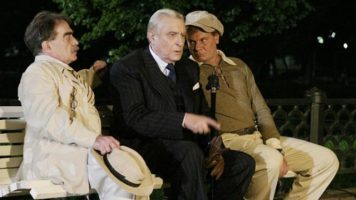 disciple Matthew as he watches his master being wheeled to his death. Matthew imagines stabbing (in red-tinted scenes) Yeshua and so ending his misery, but by the time he gets up the nerve to do it Yeshua is already crucified. That night, in the midst of a downpour, Matthew cuts down Yeshua and the other crucified men and hauls their bodies away.
disciple Matthew as he watches his master being wheeled to his death. Matthew imagines stabbing (in red-tinted scenes) Yeshua and so ending his misery, but by the time he gets up the nerve to do it Yeshua is already crucified. That night, in the midst of a downpour, Matthew cuts down Yeshua and the other crucified men and hauls their bodies away.
From here we cut to Margarita, who’s reading what we’re just been viewing—it is, of course, the Master’s suppressed manuscript, a portion of which still survives. Margarita is living alone, and unable to put her husband’s unjust arrest behind her.
The Professor and co. are still engaged in mischief making, of course. The checkered suit guy visits Prosha, a government employee he renders invisible. Prosha’s stunned colleagues react by breaking into a mass sing-along, and so are all loaded into trucks and carted off to the nearest madhouse.
Part the Sixth: Berlioz’s uncle Poplavsky turns up at his late nephew’s apartment. There he’s confronted by the checkered man, Behemoth and a top hat-wearing guy. The latter promptly pitches Poplavsky out of the room and down the stairs before inhaling the meat off a chicken wing.
Minutes later a much older guy enters, also looking to gain entrance to room 50. He’s confronted by the vampiress, who answers the door topless (so who’s complaining?). She directs him to the Professor, who’s relaxing in an opulently furnished room. The old man identifies himself as a bartender who was given counterfeit money by a patron of the previous night’s magic show. One of the Professor’s companions tells the old man precisely how much money he has in his bank account and predicts the day of his death (which will apparently occur nine months hence). The old man leaves, but as he does so notices that his hat has turned into a woman’s broach. He tosses it away, and upon hitting the ground it turns into a black cat that immediately scampers off.
Margarita is accosted on a park bench by the top hat wearing man. She initially rebuffs him, but he wins her over by quoting passages from her husband’s suppressed manuscript. He produces an ointment that he asks Margarita to rub all over naked body at 9PM that night…and promptly disappears.
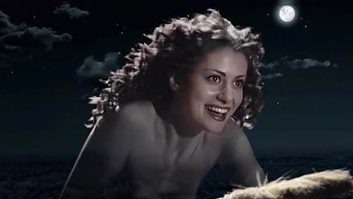 Come 9PM Margarita removes her clothes and rubs the ointment on her skin. To her increasing delight, she finds that it allows her to soar and fly around the room (and, in a striking touch, go from black-and-white to color). The guy who bequeathed the ointment phones her and tells her to meet him in a remote area. Margarita, totally exhilarated by her new condition, complies, flying off on a broom through the city.
Come 9PM Margarita removes her clothes and rubs the ointment on her skin. To her increasing delight, she finds that it allows her to soar and fly around the room (and, in a striking touch, go from black-and-white to color). The guy who bequeathed the ointment phones her and tells her to meet him in a remote area. Margarita, totally exhilarated by her new condition, complies, flying off on a broom through the city.
Invisible to everyone around her, Margarita makes a stop at the apartment of the critic Latunsky, who published the withering review of the Master’s novel that instigated his misfortune. She ransacks Latusky’s apartment until firemen show up, then flies off.
Part the Seventh: Flying over the countryside, Margarita encounters her housekeeper Natasha, who also rubbed herself with the magic ointment, and so can also fly. Natasha is sitting astride the fat functionary Ivan Savelyvich, who has been transformed into an airborne pig.
Margarita leaves Natasha and the pig behind to set down in a lake, in the depths of which water spirits frolic. In the grassland bordering the water a horned man leads several naked women in a satanic dance. The horned man calls Margarita “Queen” and gives her an elixir to drink. Following this the dancing women all literally disappear into thin air, and Margarita is shuttled away in a flying car driven by a squawking bird.
The bird driven car deposits Margarita at the building where Berlioz once lived and the Professor now resides. Inside she’s ushered up a vast staircase by a nattily dressed man who informs her that she’s to be the mistress of ceremonies at a satanic ball.
This ball turns out to be an opulent affair held in a mammoth hall—somehow contained within the modest-sized apartment 50! At one end of the hall an orchestra plays, while at the other a fire burns in a giant fireplace. From the flames the souls of various sinners, including many famous historical personages, materialize to pay their respects to “Queen” Margarita—who before long grows understandably weary. She keeps at it, though, and eventually the undead guests part to make way for the Professor and his retinue.
The severed head of Berlioz is brought out, and the Professor interrogates the bodiless but still living Berlioz about his nonexistent religious convictions. Concluding that Berlioz is of the belief that the soul enters into a state of nonbeing when its host body dies, the Professor makes this come true by killing Berlioz’s head and burning off the flesh, leaving only a gleaming skull.
Next a pretty bureaucrat, an employee of the “Spectacles Commission,” enters; the man, whose future the Professor can see, is apparently not long for this world, so the Professor elects to take him out early. The guy is shot with a gun and his blood fills up Berlioz’s empty skull. The Professor drinks the blood and encourages Margarita to do likewise.
Part the Eighth: At a meeting with the Professor and co. in room 50 (restored to its former condition), Margarita is asked what she’d most like in exchange for her services at the ball. She asks that a woman murderess she encountered at the ball be forgiven for impulsively strangling her child. The woman appears and Margarita pardons her.
But Margarita has another wish: she wants the Master to be released from captivity and placed before her “this instant!” Voila! The Master appears before her, and, even better, Behemoth produces an intact copy of the Master’s burned manuscript.
Emboldened, Margarita demands to move back into the cozy basement where she and the Master lived before his arrest, even though someone else now resides there. No problem: the basement’s current occupant, a chubby dude who ratted out the Master to the authorities after reading the withering review of his novel, appears before them—and is promptly booted out the window. With that the Professor bids the Master and Margarita farewell. A good thing, too, as minutes later the apartment is raided by authorities, who find it deserted.
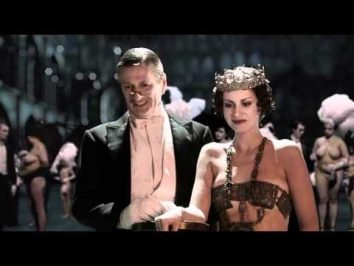 There’s another lengthy flashback to Pilate, who’s feeling guilty about crucifying Yeshua. Pilate has a long conversation with Aphranius, the head of the secret service, and orders him to look after Judas, the man who turned Yeshua in. But Aphranius is unable to protect Judas, as the latter is stabbed to death before Aphranius’ shocked eyes.
There’s another lengthy flashback to Pilate, who’s feeling guilty about crucifying Yeshua. Pilate has a long conversation with Aphranius, the head of the secret service, and orders him to look after Judas, the man who turned Yeshua in. But Aphranius is unable to protect Judas, as the latter is stabbed to death before Aphranius’ shocked eyes.
That night Plate has a dream about confronting Yeshua in the afterlife. The latter reveals that he and Pilate will be locked forever in peoples’ minds.
Part the Ninth: Yeshua’s follower Matthew is brought before Pilate, who demands he hand over the writings left him by Yeshua. After reading them Pilate offers Matthew a job but he turns it down. Ticked, Pilate reveals that Judas has been killed, much to Matthew’s dismay (he wanted to do the job himself), and takes credit for the murder.
Back in Moscow officials try and sort out what occurred over the past two days. The investigation concludes with a raid on apartment 50 by several armed functionaries. All they find is Behemoth, who they try to arrest. There ensues a wild comedic shootout that concludes with apartment 50 in flames.
From there Behemoth, in the guise of a short man, causes a near-riot in the town bakery, and then, together with the checkered man, infiltrates a posh restaurant. Policemen bust in and shoot at them, but the bullets have no effect on their intended targets, and the police succeed only in once again burning the place down.
Following a montage of vintage newsreel clips depicting the horrific round-ups and executions rampant during Stalin’s era, there’s a rooftop meeting between the Professor and Matthew from the Pilate flashbacks. Matthew relays word from Heaven that the Master and Margarita be given a full pardon and allowed to find peace. The Professor reluctantly accepts this dictum.
Part the Tenth: The checkered man turns up in the Master and Margarita’s home, and, after a brief conversation about how they’re getting on, serves them poisoned wine. They die, but are brought back as ghosts. As such they gleefully burn down their home and ride off into a stormy night on flying horses.
They set down at the insane asylum where the Master was interred, and where Stravinsky still resides. The Master enters Stravinsky’s cell and says his goodbyes. Before he does, however, he entreats Stravinsky to write a sequel to his novel…and brings in Margarita, who kisses Stravinsky on the forehead and so makes “everything as it should be.”
A second stop is a secluded plateau on the edge of a vast cliff where none other than Pontius Pilate has sat on a throne for the past two thousand years. He can’t move, and is tormented by the light of the moon that shines down on him each night. He can only be freed by the Master, who complies, telling Pilate that he can at last join Yeshua in heaven. Pilate gets up and walks off into the heavens. As for the Master and Margarita, they head off to their new home, set in a lush valley where they’re promised the peace they never had in life.
There follows an Epilogue in which an official calls an assembly to inform the citizens of Moscow that they’ve been victimized by mass hypnosis—and, as the official makes clear early on in his speech, no other point of view will be tolerated!
Stravinsky closes things out. Wandering in the town square he meets up with Nikolai Ivanovich, the disgraced money hoarder from part three, who sits babbling to himself on a park bench. Later on Stravinsky, amidst a night of tormented dreams, receives a final visit from the Master and Margarita. Margarita kisses Stravinsky on the forehead one last time, and then she and her husband walk up a beam of moonlight and THE MASTER AND MARGARITA ends.
